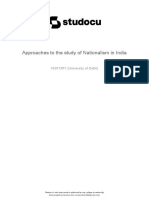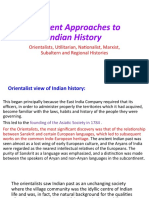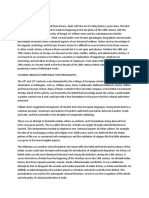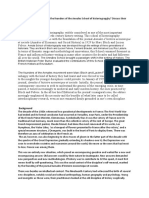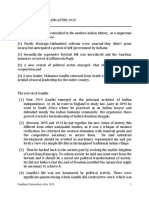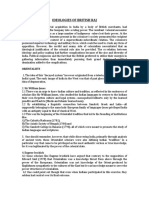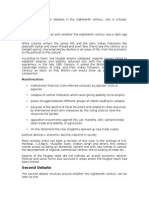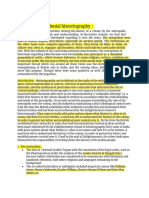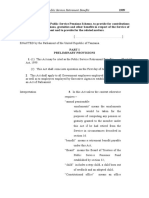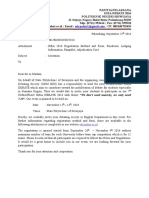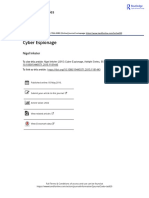Schools of Historiography PDF
Schools of Historiography PDF
Uploaded by
tanya khantwalCopyright:
Available Formats
Schools of Historiography PDF
Schools of Historiography PDF
Uploaded by
tanya khantwalOriginal Title
Copyright
Available Formats
Share this document
Did you find this document useful?
Is this content inappropriate?
Copyright:
Available Formats
Schools of Historiography PDF
Schools of Historiography PDF
Uploaded by
tanya khantwalCopyright:
Available Formats
Imperial Journal of Interdisciplinary Research (IJIR)
Vol-2, Issue-6, 2016
ISSN: 2454-1362, http://www.onlinejournal.in
Schools Of Thought on Indian
Historiography - An Interpretation.
Dr. Y. Ramesh
Associate Professor, Government Arts College-Bangalore,Karnataka
Abstract : The study of history as a scientifically the foundation for the development of the
developed discipline began only in the 19th investigation on India’s past and culture. These
century. It was only then that the historians tried to colonial writers upheld different ideologies in their
absorb the lessons of early historical writings and writings that are the Utilitarians, the Evangelicals
could develop new methods and techniques. It was and the administrative historians.
during this venture to know the art of historical
writing of the earlier period did historiography 3.THE UTILITARIAN SCHOOL.
emerged as a part of history. Historiography
simply means the history of the art of historical The utilitarian school of political philosophy was
writing. In other words, it is the history of history started by Jeremy Bentham in England. It was a
or the history of historical thought. As we know the bye product of the enlightenment of Europe. The
colonial modernity and knowledge which brought a utilitarians stood for that the power vested within
historical sense to Indians. Systematic historical the hands of the rulers must be utilised for the
writing began in India during the early period of benefit of the society. The utilitarian was another
British colonialism. The earliest and one of the school headed by the James Mill who believed that
positive results of British conquest was the the backwardness of the Indian society could only
recovery of ancient Indian history on modern lines be improved through the introduction of
of historiography. It was essential to them to know enlightened despotism. His History of British India
about the past, society and culture, and establish was the most dominant historical work among the
their authority over India. It was an outcome of the Britishers during the 19th century. It was published
administrative necessity of the Britishers also. The in the year 1828, became a trend setter for the
rulers encouraged those who shown interest in the subsequent historical works produced by colonial
past, resulted the investigation of the past and writers .and the most controversial too .He never
bringing up of new interpretations and perceptions visited India and it was the first comprehensive
on Indian history . history on India in the modern period. It covers the
history of India from the beginning of the Christian
INTRODUCTION era to the 19th century. He divided Indian history
into three separate periods, namely, Hindu,
Modern Indian historiography began with the Muhammaden and British .It was a deliberate
writings of the scholar- administrators of the attempt by him to designate the ancient and
English east India Company and they found history medieval periods of Indian history as Hindu and
as an instrument to legitimise the colonial rule by Muslim .He skilfully avoided designating the
put making some interpretations. Thus emerged modern period as Christian, instead he used the
different school of thoughts or historiographical term British. This periodisation was used by the
trends in Indian history. They are colonial or subsequent colonial historians. In fact it was the
imperialist, nationalist, Marxist, Cambridge, and recognition of the divide and rule policy of colonial
subaltern. authorities in India.
2 COLONIAL OR IMPERIALIST 4.THE EVANGELICAL HISTORIANS.
HISTORIOGRAPHY The evangelical historians—Indian history written
It was the product of the British colonialism in by them should be seen in relation to their attitude
India. In modern Indian history, the school or to Indian religions, particularly Hinduism-two such
tradition of history writing which was influential in attitudes –one of hostility and one of sympathy.
the late 19th and 20th centuries. Many intellectual During the 19th century they were following or
influences co existed in this tradition. The having hostility towards India but later their
indologists and orientalists were the real force attitudes become sympathetic. They were the
behind the development of such enquiry. They laid missionaries came to India in order to convert
Indians and they even believed that god had
Imperial Journal of Interdisciplinary Research (IJIR) Page 420
Imperial Journal of Interdisciplinary Research (IJIR)
Vol-2, Issue-6, 2016
ISSN: 2454-1362, http://www.onlinejournal.in
allowed them to conquer the country for this were a one sided view on history in general. The
purpose. The main theme of their historical writing important administrative historians were V,A.
was better criticism of all Indian things and an Smith, who produced several works on India,
uncritical justification of all British rules. They ,Macaulay, William Wilson Hunter, B Malleson
believed that the people of India could only be ,Henry Maine,J.Tallboys wheeler, Alfred Lyall,
changed progressively through Christianity and W.H.Moreland, J.D.Cunningham, James Tod,Mark
missionary education: Thus stressed on the Wilks, Grant Duff, Robert Orme,T. R Holmes,
conversion of Indians to Christianity. M.S.Elphinstone, John Dawson, E.J Stephenson
,J.Stratchy, Sir Wolsely Haig, Elliot etc.
Charles Grant was the prominent evangelical writer
in this period, his work Observation on State and It opened up new chapter in the historical writing
Society published in 1813emphasis on the in India.It influenced the history of writing India as
backwardness of this country was due to the Hindu well as the European history writing on India.Their
religion. According to him the only solution to put approach and attitudes which led to the emergence
an end to this backwardness was the acceptance of of nationalist, a native historical writing in India, a
Christianity by the Indians. According to him by reaction against to colonial distortion of Indian
the introduction of English language falsehood history.
could be weakened and variety must be flourished.
To them Britain had an important function to fulfil 6.NATIONALIST HISTORIOGRAPHY
in the history of India and it was a part of some
divine plan. The 19th century British historians played a crucial
role in provoking a nationalist reaction. This
The industrial revolution and the spread of reaction came in the form of a nationalist approach
Protestantism were also caused for the evangelism in historiography. An important element in this
in India. William Wilberforce was forefront in this approach was an effort to restore national self
movement. The new evangelism contributed two esteem and the glorification India’s past .Another
things that is combined religion with science and element was the propagation of economic
they gave kind of emphasis on science. A large nationalism through the depiction of the ruinous
number of mission societies appeared in India after economic consequences of British rule in India.
this. Most important of all, nationalist historiography
tried to re-discover India for the modern Indian
Christian mission extended the philosophy mind and promote political integration and anti
inaugurated by Grant. His work is entitled Indian imperialist sentiments to further the cause of nation
antiquities, 4 volumes, in which tried to examine building in India. The nationalist history had to
the general historical background of the Indian sub contend with not only the earlier imperialist bias in
continent from the early period itself. He attempted historiography but also a communal interpretation
tolerate Indian history with the dominant of history that began to gain influence from the
philosophy of the 19th century Europe, namely, the early decades of the century.
Hegelian dialectics. By this he was trying to relate
Indian history with the general stream of the Nationalist historiography played an important role
European philosophy and history. in providing an ideological basis of the freedom
struggle and in analysing the economic
He is also a great believer in the organized consequences of imperialism. The focus of
hierarchy of gods and the proper order of nationalist attention was on external that is
apportioning the oblation among various levels of imperialist exploitation of India, not so much the
gods. He is one of the Prajapatis and is sometimes internal i.e., class exploitation and consequent class
regarded as their chief. He is charged with the conflict within Indian society. Greater
responsibility of ensuring perpetuation of life on concentration on the latter aspect was the
earth, as also the richness and dignity in life. He is consequence of the influence of the Marxist
a very prominent person of the established order; approach, an influence increasingly evident from
and, in fact, is at its very core. the 1940s.
5.THE ADMINISTRATIVE HISTORIANS. The phrases nationalist school and nationalist
history can only be understood in the background
The administrative historians were another of the colonial domination and colonial
category for the development of historical writing historiography. History in its ,modern sense was
in India. They wrote on as a part other official duty. not written in the pre- colonialindia.the
So these writers were mainly used the official introduction of English education helped the Indian
records and reports for their writing. Hence these middle class to learn the value of historical
Imperial Journal of Interdisciplinary Research (IJIR) Page 421
Imperial Journal of Interdisciplinary Research (IJIR)
Vol-2, Issue-6, 2016
ISSN: 2454-1362, http://www.onlinejournal.in
knowledge and to get in touch with the history of post independent era ,they were B.R.Nanda,
India as well as the history of the world outside Tarachand, Amales Tripathi, Bishweshar Prasad
India. Thus newly educated Indians began to study etc. Most of this historians connected history as
the writings of colonial historians. The nationalist explanationist and propagandist. They inspired the
historians began to rectifying the historical writing people of India and awakened the self confidence
did by the colonialists. So they had possessed some and national pride among the mass which
sort of bias on their writings. strengthened the national movement.
The phrase nationalist historians were first used by The nationalist historiography has certain defects
R.C. Majumdar, to denote those historians of India too, that is some methodological defects ,some
whose writings had nationalist bias, especially chauvinist approaches on caste, cultural and social
during the period of colonial occupation. The bias .Emotion and sentiment usurped the place of
nationalist historiography helped for unearthing of reason; and detachment, balance, perspective, and
wide range of sources and re examination of all the objectivity-all became a causality. They also failed
available sources. In the course of time it received and ignored certain aspects and issues like tribes,
new impetus from the country wide agitation for women, down trodden people, marginalised
political freedom and it slowly became a part of the societies etc .some sensational accounts brought a
movement itself. sort of communal identities. It glorified Indian past
and culture and the events instead of making
The nationalists also gave importance to the study critical analysis.
of the religion or society of India. In other words
they try to defend religion and society in their 7. MARXIST HISTORIOGRAPHY
studies. The material side of Hindu culture was also
defended with equal zeal against European It was a new approach in Indian historiography or
criticism. Rajendrala Mitra who started the historical writing in India on colonialism and
nationalist writing in India with publication of nationalism. By the Marxist writing ,is not meant
some Vedic texts and the book entitled Indo- that the writers were all Marxists but that they more
Aryans. He was proud of ancient Indian heritage or less adopted materialistic interpretation as
and adopted a comparative rational view of ancient method of understanding and tool of analysis in the
Indian society. The writings of Mitra, Bhandarkar historical phenomena. Their interpretation derived
and some of the distinguished oriental scholars of from historical philosophy of Karl Marx, the
Europe were brought together in three volumes dialectical materialism. The essence of this new
entitled Civilization in Ancient India, by R C Dutt approach lies in the study of relationship between
in closing years of 1880s. According to Majumdar, social and economic organisation and its effects on
this may be regarded as the first nationalist history historical events. instead of political history they
in the best sense of the term. R.K Mukharjee ,the gave more emphasis on the history of common
fundamental unity of India, which maintained that people and the history of history less people.
the religious and spiritual fellowship among Hindus
all over India and their ideal of an all-India empire The Marxist historiography on modern India was
were the basis of Indian nationalism in the past inaugurated by one of the founders of Marxism in
.K.P Jayaswal in his Hindu Polity also deals the India M.N.Roy with his work ‘INDIA IN
thesis of oriental despotism.Dadabhai Naoroji and TRANSITION’ published in1922. It was followed
R.C..Dutt in their criticism of the British by INDIA TODAY of R.Palme Dutt in 1940 and
government on economic grounds. It created the ‘THE SOCIAL BACKGROUNDOF INDIAN
economic nationalism, the poverty and unbritish NATIONALISM’ of A.R.Desai in 1959.All the
rule in India and the economic history of India. three were classical Marxists and treated Indian
They popularised the drain theory and exposed the national movement as the representation of
exploitative character of colonialism and particular stage in the development of mode of
revolutionised the national movement .they production. India today was considered as an
cleverly used history as an instrument for making authoritative Marxist work for a long time. It
India as a nation on different realms, even though became an important school of historiography in
had some defects. India in later.Dutt and Desai studied the negative
and positive roles of Gandhi in the national
R,G.Bhandarkar ,H.C,Raychoudhary ,J.N,Sarkar movement .they highlighted the positive as ,he
,G.S ,Sardesai ,S,Krishna Swami made the national movement at mass movement by
Ayyangar,Lalalajpath Roy,C.F.Andrews, Pattabhi awakening the backward masses with national
Sittaramayya,, Girija Mukharjee etc were important consciousness. At the negative ,he restricted the
nationalist writers. The trained or academic revolutionary tendencies contained the liberal
historians also followed this style of writing in the
Imperial Journal of Interdisciplinary Research (IJIR) Page 422
Imperial Journal of Interdisciplinary Research (IJIR)
Vol-2, Issue-6, 2016
ISSN: 2454-1362, http://www.onlinejournal.in
bourgeois nationalism to operate ,as he represented Galleghar, Gordon Johnson, Judith Brown, Ayesha
the Indian bourgeoisie. Jalal, David Washbrook, C.J.Baker, C.A .Bayly
,D.Rothermund and many other scholars also made
In the post independent period the historians like similar interpretations. The neo imperialist writers
D.D.Kossambi, R.S.Sharma, RomilaThapar,Bipan analysed the existence of colonialism in India as
Chandra, Sumit Sarkar,Sushobhan Sarkar, Sunil political ,social, economic and cultural structure
Sen, Hiran mukharjee, K.N.Panikkar, Irfan Habeeb and given interpretations. They had analysed
and many others have dedicated their studies for nationalism too and put forward the theories on
the development of historiography. nationalism ,the causative factors and its evolution
and the contradictions in the national movement.
The Marxist historians tried to the transformation They envisages colonialism as a foreign rule and
of India in the time of colonialism and looked it as the notions like the transformation of Indian
a part of the growth of word capitalism and economy and the beginning of the national
exploitative concerns of British imperialism. Dutt’s movement was not an outcome of the British rule.
seminal work India today, clearly analyses the They considered it as an elitist movement. To them
colonial phase in India as three categories. The first caste and religion were the basis of political
phase as mercantilism or merchant capitalism under organisation and nationalism was a mere cover.
the company.from1757- 1813,followed by the stage The national movement represented the struggle
of industrial capitalism as a result of industrial one group of elite against the other for the British
revolution ,from1813-1858 (marketisation),and the favours.
final one as finance capitalism as the capital and
colonial investments. Later it became the perennial The neo- imperialist historians argued and
theme of the nationalist writings. The Marxist supported a pro attitude and severely criticises the
historians turned their attention on the inner national movement and the national leaders. They
contradictions of the Indian society ,the consider it as instrument of the elitist for their own
marginalised sections like peasants and workers, selfish interests and leaders were motivated by the
and highlighted their role in the movement, power and material benefits and consider it as a
women’s role etc. They even questioned communal play for power. They consider Gandhi, Nehru and
periodisation of India. Patel as the chief political brokers and Gandhi is
characterised by them as a compromiser between in
The early Marxists viewed national movement as a Indian people and British government. They
bourgeoisie movement like Dutt and Desai. But the portrayed all agitations and movements as high
historians like Bipan Chandra criticise this view dramas of the leaders and they also point out this
with his newly researches on the movement and by explicating the constitutional reforms and the
publication of the works. The Marxist writings following agitations, the doses of constitutional
broadened the history from the state to society. reforms,. Mont-ford reforms followed by
They brought the interdisciplinary approach in the N.C.M,the Simon commission by the C.D.M and
recent studies, a new style of explanation to the the Cripps mission by the Quit India Anil Seal out
problems. rightly questions the nationalism and tried to
denigrate the national movement by picturing as a
8.NEO- IMPERIALIST APPROACH mimic warfare. Unlike the early imperialist writers,
the imperialist cornered their studies to the
It emerged in the1960sand gathered momentum in localities but like them ,it also tried to justify and
the 1980s and1990s and the publication of the
legitimize the colonial rule in India.
books and articles brought a new trend in the
historiography and by looking the national 9.SUBALTERN STUDIES
movement in the neo imperialist line. These
scholars were belongs to the universities of The subaltern studies introduced a new trend in the
England, America and Germany also known as historical research in modern Indian historiography.
CAMBRIDGE HISTORIANS. They have the development of the historical writing in the
unearthed several source materials in the form of 1960s was the beginning of this new style of
official records, diaries, police reports etc with the enquiry for the history of history less people .this
purpose of providing a new interpretation to the new initiative was taken by the historians like
Indian national movement .Anil Seal and John Rodny Hilton,E.P. Thompson, Eric Hobsbawm,
Broomfield were the founders of this school .Anil George Rude, Sobul etc had a direct influence on
Seal’s, Emergence 0f Indian Nationalism and writing by placing common people in the centre of
Broomfield’s Elite Conflict in Plural Society the studies. they characterised this trend as history
;Twentieth Century Bengal inaugurated this from below, or peoples history ,or grassroots
approach of historiography. Following them John history etc .the appearing of this new trend was in
Imperial Journal of Interdisciplinary Research (IJIR) Page 423
Imperial Journal of Interdisciplinary Research (IJIR)
Vol-2, Issue-6, 2016
ISSN: 2454-1362, http://www.onlinejournal.in
the last two decades of the twentieth century as the CONCLUSION
subaltern studies.
T.R.Adams defines, colonialism in his book
Subaltern a term taken from the Antonio ‘Modern colonialism: Institutions and Policies’ as
Gramsci’s,the Italian socialist and thinker , his the political control of an under developed people
manuscript ‘Prison Notebooks’ ,meaning of inferior whose social and economic life is directed by the
ranker, or common people; whether of class, caste , dominant power. The word colonialism, alleged
age, gender etc. it bring to light the lower sections policy of exploitation on backward or weak people
of the Indian people hitherto neglected by by a large power. There will be the political
historiography. sovereignty, it can be achieved by force, by
political collaboration, by economic, social or
A series of subaltern studies volumes were cultural dependence.
published on Indian national movement under the
editorship of Ranajit Guha.He protests that the Colonialism makes the colonial societies an
historiography of Indian nationalism is beset with a integral part of world capitalism. A colony is
prejudiced elitism of two kinds, the colonial or integrated into world capitalist system, but without
imperialist approach and the nationalist approach. taking part in industrial revolution of the
thus he insist the relevance of the subaltern development of capitalist production. It was a
approach and stated that the hitherto historiography phenomenon after the 15th century. The decline of
of Indian nationalism has been dominated by feudalism or the transformation of the society and
elitism-colonial elitism and bourgeoisie elitism- development of new knowledge system which
both originated as the ideological product of British paved the way for the emergence of capitalist
rule in India. system in the world. As a result of this
transformation the social change was one of the
To the subaltern historians there are only two important features. The emergence of joint stock
sections in the society-the elitists and the companies and merchant classes and the revival of
subaltern., so it is the time to write the history of trade directly led to the capital system in the world,
subalterns. Thus the subaltern historians focussed change in the feudal mode to the capital mode of
on the subjugated or subordinated people such as productions. This powerful mercantile group or
tribals, peasants, oppressed women, workers, poor class became the most influential people in the
and other marginalised sects of the society who society.
have played a key role in making the history and
society. They severely criticised the existing notion REFERENCES
of the history because of the partial history., all the
history was the history of the elites. The subaltern A. K. Warder, An introduction to Indian historiography,
Bombay, 1972.
writers have produced several articles on hitherto
unexplored or the virgin areas of research on Barnes, H.E., A History of Historical Writing, New
different titles, topics, issues, events, incidents, York, 1963.
rebellions, etc related with the history and society
of India. C. H. Philips, Historians of India, Pakistan and Ceylon,
London, 1961.
The important subaltern writers like David Arnold,
Gyan Pandey, Partha Chatterjee, Shahid Amin, C. Prabha, Historical Mahakavyas in Sanskrit (Eleventh
Tanika Sarkar, Sumit Sarkar, Gayathri Spivak, to fifteenth century AD), New Delhi, 1976.
Julie Stephens, Aravind Das, N.K Chandra,
D. D. Kosambi, An introduction to the study of Indian
Stephen Henningham, Dipesh Chakraborthy, history, 2nd. edn. Bombay, 1975.
Goutam Bhadra, etc have enriched the subaltern
historiography. But later some of these writers also D. Lorenzen, 'Imperialism and the historiography of
criticised it. ancient India' in S. N. Mukherjee, ed. India: history and
thought - Essay in honor of A. L. Basham, Calcutta,
They have criticised the colonial, Cambridge, 1982.
nationalist and Marxist schools of historiography.
The necessity of the re writing of Indian history is Ghosal, U.N., The Beginning of Indian Historiography
asserted by them, but the term subaltern itself a and other Essays, Calcutta, 1944.
curious one and it is a mixture of different groups
Jain, J.P., The Jaina Sources of the History of Ancient
with different aspirations. India (100 B.C to A.D 900), Delhi, 1964
N. R. Ray (ed. vol. 110,), Sources for the history of
India, Calcutta, 1978-1980.
Imperial Journal of Interdisciplinary Research (IJIR) Page 424
Imperial Journal of Interdisciplinary Research (IJIR)
Vol-2, Issue-6, 2016
ISSN: 2454-1362, http://www.onlinejournal.in
Pargiter, F.E., Ancient Indian Historical Tradition,
London, 1922.
R. Lannoy, The speaking tree, A study of Indion culture
and Society, London, Oxford, New York, 1971.
R. Thapar, Ancient Indian social History, New Delhi,
1978.
R.C.Majumdar, Social and Cultural History of ancient
India,: Vedic age, Vol-1, B. V. Bhavan, Bombay, 1951 -
1961.
Saiyid Athar Abbas Rizvi, Religious and intellectual
history of the Muslims in Malabar's reign, New Delhi,
1976.
Singh, G.P., Early Indian Historical Tradition and
Archaeology, Delhi, 1994.
Imperial Journal of Interdisciplinary Research (IJIR) Page 425
You might also like
- The Big Bangs of IR SummaryDocument9 pagesThe Big Bangs of IR SummaryEsther VNo ratings yet
- Approaches To The Study of Nationalism in IndiaDocument5 pagesApproaches To The Study of Nationalism in IndiaMuskan ban100% (3)
- Mauryan Art & ArchitectureDocument6 pagesMauryan Art & ArchitectureRamita Udayashankar85% (13)
- 18 Medina v. KoikeDocument1 page18 Medina v. Koikeanne6louise6panagaNo ratings yet
- Path To FreedomDocument201 pagesPath To FreedomTobyPhernettonNo ratings yet
- Virgil Kit Augustin H. Abanilla Law 4 EvidenceDocument8 pagesVirgil Kit Augustin H. Abanilla Law 4 EvidenceCarlito HilvanoNo ratings yet
- Different Approaches To The Study of Indian History NDocument37 pagesDifferent Approaches To The Study of Indian History NAbhinav Jain100% (1)
- Nationalism in IndiaDocument14 pagesNationalism in IndiaMohit Kumar Kumar100% (6)
- HISTORIOGRAPHIESDocument3 pagesHISTORIOGRAPHIESShruti JainNo ratings yet
- Major Approaches To The History of Modern IndiaDocument4 pagesMajor Approaches To The History of Modern IndiaLast RoninNo ratings yet
- Imperialist HistoriographyDocument3 pagesImperialist Historiographytiewkhongwir77100% (1)
- Debate On Indian FeudalismDocument19 pagesDebate On Indian FeudalismGourav Shaw50% (2)
- Economic History of Early Medieval IndiaDocument52 pagesEconomic History of Early Medieval IndiaALI100% (3)
- Swadeshi and RadicalsDocument27 pagesSwadeshi and RadicalsAshishNo ratings yet
- Rise of Rajputs and The Nature of StateDocument3 pagesRise of Rajputs and The Nature of StateSanchari DasNo ratings yet
- MA History IGNOU HistoriographyDocument17 pagesMA History IGNOU HistoriographyAPA SKGNo ratings yet
- Nature of Chola State - Docx PresentationDocument8 pagesNature of Chola State - Docx Presentationpriyanka100% (7)
- Vedic AgeDocument8 pagesVedic AgeRamita Udayashankar100% (2)
- NATURE OF REVOLT OF 1857 by VARUN KUMARDocument9 pagesNATURE OF REVOLT OF 1857 by VARUN KUMARVarun PandeyNo ratings yet
- Post-Mauryan SourcesDocument2 pagesPost-Mauryan SourcesRamita Udayashankar100% (3)
- Nationalism and Social Group Interfaces PDFDocument93 pagesNationalism and Social Group Interfaces PDFdeeksha verma86% (7)
- Sources of Medieval HistoryDocument15 pagesSources of Medieval HistorySwaroopa KhangarotNo ratings yet
- Indian FeudalismDocument7 pagesIndian FeudalismRamita Udayashankar85% (27)
- Historiography On The Nature of Mughal StateDocument3 pagesHistoriography On The Nature of Mughal StateShivangi Kumari -Connecting Fashion With HistoryNo ratings yet
- Trade in Early Medieval IndiaDocument3 pagesTrade in Early Medieval IndiaAshim Sarkar100% (1)
- Debates Over 18th Century India Change V PDFDocument6 pagesDebates Over 18th Century India Change V PDFAbhishek Shivhare100% (1)
- Indian Feudalism DebateDocument16 pagesIndian Feudalism DebateJintu ThresiaNo ratings yet
- How Feudal Was Indian Feudalism? - R. S. SharmaDocument2 pagesHow Feudal Was Indian Feudalism? - R. S. SharmaRamita Udayashankar100% (1)
- Nature of The Chola State PDFDocument4 pagesNature of The Chola State PDFNainaNo ratings yet
- GENDER - Trends of Feminist Historiography Modern IndiaDocument3 pagesGENDER - Trends of Feminist Historiography Modern IndiasmrithiNo ratings yet
- Decline of The MauryansDocument2 pagesDecline of The MauryansRamita Udayashankar100% (1)
- Gandhian NationalismDocument31 pagesGandhian NationalismMihir KeshariNo ratings yet
- The Marathas Under The Peshwas HistoryDocument11 pagesThe Marathas Under The Peshwas HistoryShubham SrivastavaNo ratings yet
- Origin of RajputsDocument11 pagesOrigin of Rajputskulbhushan100% (2)
- A Study of Persian Literature Under The Mughals in IndiaDocument5 pagesA Study of Persian Literature Under The Mughals in IndiapoocNo ratings yet
- 18th Century As A Period of TransitionDocument5 pages18th Century As A Period of TransitionAshwini Rai0% (1)
- Later Vedic PeriodDocument23 pagesLater Vedic PeriodAvneet Ghai80% (5)
- Ideology of RajDocument8 pagesIdeology of RajAnushree Mahindra100% (1)
- Suhungmung As One of The Greatest Ahom KingsDocument8 pagesSuhungmung As One of The Greatest Ahom KingsNandita Das100% (1)
- INC-Moderates and ExtremistsDocument5 pagesINC-Moderates and ExtremistssmrithiNo ratings yet
- The War of SuccessionDocument5 pagesThe War of SuccessionZOEYNo ratings yet
- The Paleolithic AgeDocument3 pagesThe Paleolithic Ageami100% (1)
- Agrarian CrisisDocument2 pagesAgrarian CrisisAnjneya Varshney100% (2)
- Unit-1prehistory Protohistory and HistoryDocument13 pagesUnit-1prehistory Protohistory and HistoryLaddan BabuNo ratings yet
- Indian Feudalism Debate AutosavedDocument26 pagesIndian Feudalism Debate AutosavedRajiv Shambhu100% (1)
- (A) Agricultural Production in Mughal India: Unit 3: Rural Economy and SocietyDocument17 pages(A) Agricultural Production in Mughal India: Unit 3: Rural Economy and Societyila100% (1)
- 18th Century DebateDocument2 pages18th Century DebateAnjneya Varshney100% (10)
- Formation - INC - AO HUME & LORD DUFFERIN..Document9 pagesFormation - INC - AO HUME & LORD DUFFERIN..smrithi100% (1)
- Architectural Heritage of Medieval Ahom Kingdom: A Brief Study of The Ahom MonumentsDocument6 pagesArchitectural Heritage of Medieval Ahom Kingdom: A Brief Study of The Ahom MonumentsSomya Bansal100% (2)
- Communalism in Modern IndiaDocument12 pagesCommunalism in Modern IndiaRamita Udayashankar100% (3)
- Akbar's Rajput Policy: Causes, Features and Significance: Jangila MushaharyDocument4 pagesAkbar's Rajput Policy: Causes, Features and Significance: Jangila MushaharyAmit Dungdung100% (1)
- Linguistic Reorganization of Indian StatesDocument4 pagesLinguistic Reorganization of Indian StatesVanshika Yadav100% (1)
- Causes of 1911 Chinese RevolutionDocument2 pagesCauses of 1911 Chinese RevolutionGa Jing71% (7)
- MHI 06 Assignment IGNOUDocument6 pagesMHI 06 Assignment IGNOUAPA SKG100% (3)
- Nature of State of Early Medieval India PDFDocument7 pagesNature of State of Early Medieval India PDFNitu KundraNo ratings yet
- Jagirdari N CrisisDocument10 pagesJagirdari N CrisisRichard KeifthNo ratings yet
- The Mathura, Gandhara School of ArtDocument4 pagesThe Mathura, Gandhara School of ArtmirzaNo ratings yet
- 9 Historiography of Indian Nationalism PDFDocument12 pages9 Historiography of Indian Nationalism PDFAryan AryaNo ratings yet
- Main Perspectives On Colonialism in IndiaDocument2 pagesMain Perspectives On Colonialism in IndiaAmvi SwuNo ratings yet
- 078 PDFDocument6 pages078 PDFEnglish EnglishNo ratings yet
- BA History Making of Indian NationDocument158 pagesBA History Making of Indian NationAnonymous GUitcVONo ratings yet
- History 302 PDFDocument23 pagesHistory 302 PDFKhyati BhattNo ratings yet
- Aditya Singh-2016130 - Hoi-1st Assignment - 1ST YrDocument9 pagesAditya Singh-2016130 - Hoi-1st Assignment - 1ST YrAditya SinghNo ratings yet
- Pak Affairs - Dawn Reports (1947-2017)Document78 pagesPak Affairs - Dawn Reports (1947-2017)Arslan SajjadNo ratings yet
- PPG W1Document41 pagesPPG W1Sc MaratasNo ratings yet
- Concept of Practice of Law CasesDocument28 pagesConcept of Practice of Law CasesMelissaRoseMolinaNo ratings yet
- Rights of OfwDocument8 pagesRights of Ofwmary faith dalogdogNo ratings yet
- Got Grievances PDFDocument8 pagesGot Grievances PDFti0% (1)
- Sample Theory For Fundamental Rights - UGC NET LAW UNIT-2Document34 pagesSample Theory For Fundamental Rights - UGC NET LAW UNIT-2Harsh Vardhan Singh HvsNo ratings yet
- The Land Acquisition Act, 1894: Ibid. IbidDocument1 pageThe Land Acquisition Act, 1894: Ibid. IbidLawyer legalNo ratings yet
- Po2 Molina ExplanationDocument3 pagesPo2 Molina ExplanationUmingan PSNo ratings yet
- 2g SpectrumDocument9 pages2g Spectrummani_engiNo ratings yet
- UNCLOSDocument27 pagesUNCLOSAlexander SevillaNo ratings yet
- PSPF ActDocument60 pagesPSPF ActAGATHA LEANDYNo ratings yet
- Robinson Vs MirallesDocument2 pagesRobinson Vs MiralleslividNo ratings yet
- Case Digest - Heirs of Carlos V LinsanganDocument3 pagesCase Digest - Heirs of Carlos V LinsanganMarc Louis100% (1)
- Colleen Toomey ResumeDocument3 pagesColleen Toomey ResumecolleenptoomeyNo ratings yet
- LA TONDEÑA WORKERS UNION Vs Sec of LAborDocument2 pagesLA TONDEÑA WORKERS UNION Vs Sec of LAborJessy FrancisNo ratings yet
- Saggaf Al-Saggaf ID: SB0006 Business English 2Document12 pagesSaggaf Al-Saggaf ID: SB0006 Business English 2ahmad Al-SaggafNo ratings yet
- Invitation Letter, Rules and Regulations, Registration FormDocument6 pagesInvitation Letter, Rules and Regulations, Registration FormMuhammad RoziNo ratings yet
- Cyber Espionage: Adelphi SeriesDocument33 pagesCyber Espionage: Adelphi SeriesArun KumarNo ratings yet
- Constilaw Case 4 PDFDocument194 pagesConstilaw Case 4 PDFFJ Valerio - LumioNo ratings yet
- Comparative Political Studies: Interests, Inequality, and Illusion in The Choice For Fair ElectionsDocument30 pagesComparative Political Studies: Interests, Inequality, and Illusion in The Choice For Fair ElectionsAna Maria Ungureanu-IlincaNo ratings yet
- Republic Vs BenignoDocument2 pagesRepublic Vs BenignoAnonymous 5MiN6I78I0No ratings yet
- 288 BPDocument4 pages288 BPlookthemoon2009No ratings yet
- Resolution No. 22 Bdc-2021 (Approving DTP)Document2 pagesResolution No. 22 Bdc-2021 (Approving DTP)barangay cawayanNo ratings yet
- 3 Mandela Is Free v3 Read and Respond Answers PDFDocument2 pages3 Mandela Is Free v3 Read and Respond Answers PDFJosé Vinícius CostaNo ratings yet
- People v. Quidato JR - GR No. 117401 297 SCRA 1 (1998) Ro Ero! J"Document11 pagesPeople v. Quidato JR - GR No. 117401 297 SCRA 1 (1998) Ro Ero! J"Em-em MaguenNo ratings yet
- Remedies For Structural ViolenceDocument8 pagesRemedies For Structural ViolenceUrooj ZafarNo ratings yet
- Letter - President.trump.5.20.20 691329 7Document2 pagesLetter - President.trump.5.20.20 691329 7Law&CrimeNo ratings yet

